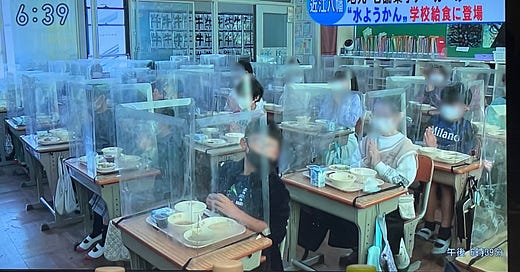The Japanese government has graciously decided to tell schools that they can stop treating kids like inmates of a maximum security prison and instead treat them like inmates of a medium security prison. From the Mainichi.
Japan's education ministry released a notification on Nov. 29 confirming that students are allowed to talk with each other during lunch time if schools take appropriate COVID-19 countermeasures.
According to the notice, children are allowed to talk if necessary measures, such as positioning seats so they will not face each other, and securing ventilation, are taken.
To clarify the bizarre request about seat direction, school lunches used to look like this…
…but since May 2020 have looked like this.
Anyone who thinks seating layout during lunch affects infection risk should certainly be in education, just not employed in it.
So will the national government apologise to and beg forgiveness from Japanese children for making them suffer this obnoxious policy for the last 2.5 years? Nope. In fact, the Ministry of Education, Culture, Sports, Science and Technology (MEXT) has instead gone the full Shaggy: “It wasn’t me.”
Apparently, it was the schools and boards of education that came up with and enforced this miserable rule. But if MEXT didn’t request schools to make kids eat in silence, then 1) why were schools making kids eat in silence and 2) why didn’t MEXT say anything publicly until now? (I’m indebted to lawyer/commentator Hitofumi Yanai for tracking down the below info.)
MEXT’s original guidelines in May 2020 requested the following.
During meals, measures need to be taken to prevent the spread of droplets, for example by preventing desks from facing each other and/or refraining from conversations. (会食にあたっては、飛沫を飛ばさないよう、例えば、机を向かい合わせにしない、または会話を控えるなどの対応が必要です。)
So this could have been interpreted to mean lunchtime conversations were fine if students weren’t facing each other. But no schools or boards of education interpreted it that way, and MEXT certainly didn’t publicly state it could be interpreted that way. By not publicly clarifying their position on lunchtime conversations, MEXT implicitly supported a blanket policy of silent lunches.
But since August 2020, the guidelines have been as follows.
During meals, measures need to be taken to prevent the spread of droplets, for example by preventing desks from facing each other and/or refraining from loud conversations. (会食にあたっては、飛沫を飛ばさないよう、例えば、机を向かい合わせにしない、または大声での会話を控えるなどの対応が必要です。)
Now, this can clearly be interpreted to mean lunchtime conversations are okay as long as the kids don’t shout. But this minor unannounced change on page 56 of the updated guidelines is in no way enough to make Japanese schools and boards of education change their policies. That would require MEXT to publicly state “It’s okay to talk during lunch”, which it didn’t until now.
And again, MEXT was as silent as a Japanese classroom at lunchtime when the Tokyo Board of Education produced a insultingly stupid pamphlet in 2021 requesting that students not converse during lunch, wear masks while getting changed, and wear masks while resting during sports and not talk while drinking.
Of course, even if MEXT had openly called for schools to let kids talk during lunch, many schools would’ve continued silent lunches for the same reasons almost all organisations/institutions in Japan follow other embarrassingly moronic Covid rules. 1) They believe SARS-Cov-2 is an ultra dangerous virus warded off by superstitious rituals and/or 2) they want to show the public that they’re taking so-called infection prevention measures to avoid negative media coverage and complaints from credulous people who believe it, especially when someone tests positive.
As an example of Point 2, even now many schools bring out desk partitions when TV crews visit.
Covid-era Japan can best be understood as a place where educators think the above image leaves a good impression.
Another hinderance to normal social functioning inside and outside of schools is the close-contact criteria set by the Ministry of Health, Labour and Welfare: someone who spends more than 15 minutes within 1 meter of a confirmed case while unmasked. But in April 2022, MEXT decided that the MHLW’s definition wasn’t ridiculous enough.
Among people who had contact (from 2 days prior to symptom onset) at school with a confirmed case, people who conversed with the confirmed case during mealtimes without taking infection prevention measures like mask-wearing are to stay home even if they don’t meet the formal criteria for being a close contact. (濃厚接触者に特定されない場合であっても、学校で感染者と接触(感染者の感染可能期間(発症2日前~)の接触)があった者のうち、会話の際にマスクを着用していないなど感染対策を行わずに飲食を共にした者等は出席停止の措置を取ります。)
In other words, MEXT is telling schools that if they let kids converse unmasked during lunch and one of the class tests positive, whoever talked to him/her will have to stay home for a week. And that would mean their parents also having to stay home for a week, doubtlessly leading to numerous complaints toward the school. So not only did MEXT implicitly support the silent lunch policy, it explicitly incentivised it too. Pushing responsibility onto schools after all this is a bit rich.
This long and depressing episode shares commonalities with most other aspects of Japan’s Covid response. 1) The government clearly cares little about the costs or negative effects of its policies. 2) The media hardly ever questions the necessity of the government’s actions. 3) The opposition parties offer next to no opposition. 4) Organisations prioritise ostentatious rule-following and make little public criticism of government policy. 5) People comply to avoid standing out, causing a fuss, and being thought of as trouble-makers.
In the Anglosphere, various members of the anti-Covid restriction/mandate side wrote justifiably angry responses to the weaselly suggestion for a Covid amnesty made by economist Emily Oster, who decided to side with the villains by supporting school mask mandates even though her own data showed they were meritless. But a similar amnesty suggestion is unimaginable in Japan. Because there is basically only one side. And almost nobody will admit it has done anything wrong.










https://vigilantfox.substack.com/p/japanese-professor-goes-nuclear-on
Children catch healing from each other not disease. This is child abuse no doubt about it. They need to see each others faces, smiles and interact to develop properly
😢